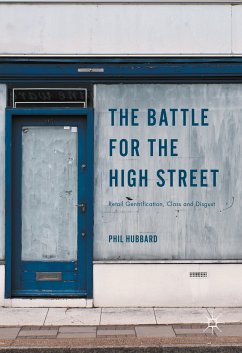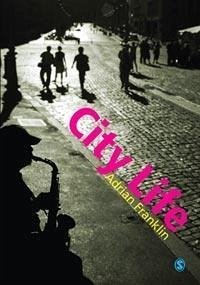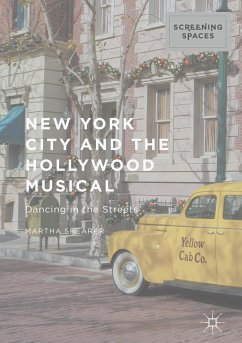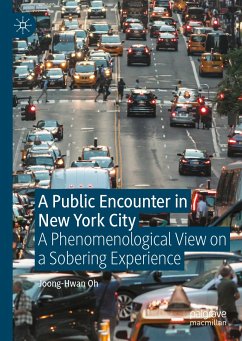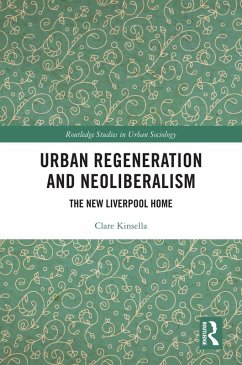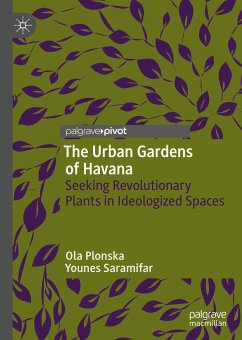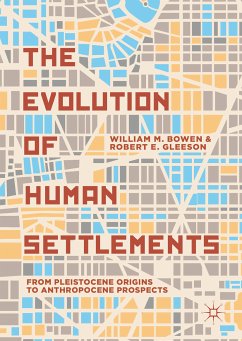
The Media City (eBook, PDF)
Media, Architecture and Urban Space
Versandkostenfrei!
Sofort per Download lieferbar
42,95 €
inkl. MwSt.
Weitere Ausgaben:

PAYBACK Punkte
21 °P sammeln!
"If only more new media commentators had this level of historical-critical reference, engaging, good stories, and a degree of wonder at what media and windows bring to the city, to life." - John Hutnyk, Goldsmiths, University of London "Just when you thought the last word had been said about cities and media, along comes Scott McQuire to breathe new life into the debate. When revisiting existing pathways, his always ingenious eyes produce startling and original insights. When striking out into new territory, he opens up before us inspiring new vistas. I love this book." - James Donald, Univers...
"If only more new media commentators had this level of historical-critical reference, engaging, good stories, and a degree of wonder at what media and windows bring to the city, to life."
- John Hutnyk, Goldsmiths, University of London
"Just when you thought the last word had been said about cities and media, along comes Scott McQuire to breathe new life into the debate. When revisiting existing pathways, his always ingenious eyes produce startling and original insights. When striking out into new territory, he opens up before us inspiring new vistas. I love this book."
- James Donald, University of New South Wales
"A book that crams into a single chapter more insights and illustrations than seems feasible, yet which ties all threads together through a consistent, theoretically rich analysis of the interplay of media and city... Writing with effusiveness uncharacteristic of back-cover blurbs on academic tomes, James Donald says 'I love this book'. But I will end by echoing his praise, and make a promise to readers: you will love The Media City, too."
- European Journal of Communication
"Refreshingly clear, getting to grips with some of the key concepts of urban sociology in a way that moves beyond the wistful evocation and splatter of undigested terms that characterises so much academic writing on culture and cities."
- Media, Culture & Society
Significant changes are occurring in the spaces and rhythms of contemporary cities and in the social functioning of media. This forceful book argues that the redefinition of urban space by mobile, instantaneous and pervasive media is producing a distinctive mode of social experience.
Media are no longer separate from the city. Instead the proliferation of spatialized media platforms has produced a media-architecture complex - the media city. Offering critical and historical analysis at the deepest levels, The Media City links the formation of the modern city to the development of modern image technologies and outlines a new genealogy for assessing contemporary developments such as digital networks and digital architecture, web cams and public screens, surveillance society and reality television.
Wide-ranging and thoughtfully illustrated, it intersects disciplines and connects phenomena which are too often left isolated from each other to propose a new way of understanding public and private space and social life in contemporary cities. It will find a broad readership in media and communications, cultural studies, social theory, urban sociology, architecture and art history.
Winner of the 2009 Jane Jacobs Urban Communication Award, awarded by the Urban Communication Association.
- John Hutnyk, Goldsmiths, University of London
"Just when you thought the last word had been said about cities and media, along comes Scott McQuire to breathe new life into the debate. When revisiting existing pathways, his always ingenious eyes produce startling and original insights. When striking out into new territory, he opens up before us inspiring new vistas. I love this book."
- James Donald, University of New South Wales
"A book that crams into a single chapter more insights and illustrations than seems feasible, yet which ties all threads together through a consistent, theoretically rich analysis of the interplay of media and city... Writing with effusiveness uncharacteristic of back-cover blurbs on academic tomes, James Donald says 'I love this book'. But I will end by echoing his praise, and make a promise to readers: you will love The Media City, too."
- European Journal of Communication
"Refreshingly clear, getting to grips with some of the key concepts of urban sociology in a way that moves beyond the wistful evocation and splatter of undigested terms that characterises so much academic writing on culture and cities."
- Media, Culture & Society
Significant changes are occurring in the spaces and rhythms of contemporary cities and in the social functioning of media. This forceful book argues that the redefinition of urban space by mobile, instantaneous and pervasive media is producing a distinctive mode of social experience.
Media are no longer separate from the city. Instead the proliferation of spatialized media platforms has produced a media-architecture complex - the media city. Offering critical and historical analysis at the deepest levels, The Media City links the formation of the modern city to the development of modern image technologies and outlines a new genealogy for assessing contemporary developments such as digital networks and digital architecture, web cams and public screens, surveillance society and reality television.
Wide-ranging and thoughtfully illustrated, it intersects disciplines and connects phenomena which are too often left isolated from each other to propose a new way of understanding public and private space and social life in contemporary cities. It will find a broad readership in media and communications, cultural studies, social theory, urban sociology, architecture and art history.
Winner of the 2009 Jane Jacobs Urban Communication Award, awarded by the Urban Communication Association.
Dieser Download kann aus rechtlichen Gründen nur mit Rechnungsadresse in A, D ausgeliefert werden.




